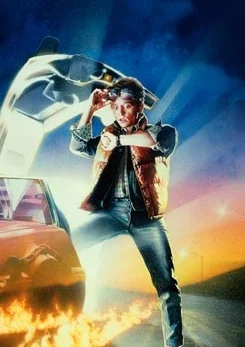This is my first attempt at a blog, so bear with me.
For my inaugural post, I thought I'd answer (in painstaking detail) a question that I often get: how did I come up with the idea for my books? In short, it was because I was dissatisfied with what was out there. Specifically, the whole sub-genre of science fiction that dealt with time travel always bothered me. Whether in books or movies, it never quite sat right with me. After sitting down to think about it, I realized that my issues with time travel and its treatment in pop culture fell into three main categories. (Just to be clear, I'm talking about time travel into the past. Time travel into the future doesn't give me heartburn.).
If you're wondering what this has to do with my books (since they don't chiefly deal with time travel on face value), then keep reading... I get there, I promise. Here are the three main categories of time travel literature as I see it:
1. The present sucks, so go back and change it - Examples: Terminator, Back to the Future, Looper
This represents the most common treatment of time travel in popular literature, but also the most problematic -- that's because of paradoxes. A paradox is a logical inconsistency. The classic example would be going back in time and murdering your own grandparent (accidentally or otherwise). Doing so would make you no longer exist in the future. But if you no longer exist in the future, you would never have been able to travel back in time to murder your grandfather. But if that were the case, then your grandfather would still live and you would then exist, and would then go back in time to murder you grandfather. Et cetera. This is an extreme example, but pretty much any change in the timeline would cause some kind of paradox, and therefore is impossible. This kind of brain-hurting plot makes for awesome action movies, but unravels entirely at the briefest nudge. Honorable mention: Bill and Ted's Excellent Adventure (because it doesn't take itself seriously).
2. The past is written, and therefore you can't change anything no matter how hard you try - Examples: Harry Potter and the Prisoner of Azkaban, Twelve Monkeys
Imagine that an unknown assailant shot and killed your best friend when you were a kid. You grow up and invent time travel (congratulations) in an effort to go back and save your friend's life. You plan to camp out where the murder took place and take out the assailant before he (statistically it's a "he") can carry out the murder. But somehow things get messed up and you end up accidentally shooting a random kid on the playground you were staking out -- your best friend. It turns out the mystery shooter was you all along! In an effort to prevent an event in the past, you inadvertently caused it to come to fruition because nothing can violate the timeline. Period. Now on the surface of it, I have no problem with these stories. They're logically consistent (on face value, but not really... as I'll get to in a minute).
My main problem with this style of writing is that it's not interesting. You already know what's going to happen because the ending is the beginning's premise. Furthermore, it violates free will. Now some will argue that free will is an illusion, but I prefer to think it's not, so there. It argues for destiny -- the protagonist has no actual choice in what's going to happen to him or her. Everything is going to play out exactly as it should with no deviations from the script.




